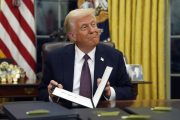
Jeanette Manfra, the chief cybersecurity official for the Department of Homeland Security (DHS), was quoted on NBC News website as saying there is evidence of Russian penetration into multiple states’ voter registration databases.
According to the NBC News website, Manfra said in an exclusive interview with NBC News, “We were able to determine that the scanning and probing of voter registration databases was coming from the Russian government.” The site added, “There is no evidence that any of the registration rolls were altered in any fashion, according to U.S. officials.”
In the absence of any further details, it’s good to review the specific facts as stated so far. Scanning voter registration databases is essentially scanning public information. The lists of eligible voters and whether or not they voted is necessarily public information. If not, there would be no way to investigate whether or not there was electoral fraud based on fraudulent use of voters’ names. Voter integrity organizations such as True the Vote scan voter registration databases regularly and report their anomalies, such as voter registrations at non-existent addresses or counties that have more registered voters than eligible persons found by the most recent census. If the Russians have thoroughly scanned this public information, perhaps they can give an assessment of how well True the Vote volunteers have done their homework.
How Do Fraudulent Voter Registrations Become Fraudulent Votes?
The two major types of fraud using assumed voters’ names are absentee ballot fraud and having repeaters, the nickname for people who vote more than once, either during early voting or on election day, again using assumed names. The assumed names can be real voters who did not vote and have no idea someone voted using their names. They could be voters who have died or moved away, but haven’t been cleaned off the registration lists. They can be people from out of state who either fraudulently register to vote in another state or allow their names to be used for that purpose. Also, the assumed names can be fraudulent voter registrations of people who never existed except on voter registration databases.
Manfra was quoted as saying the Russians probed the databases, but didn’t explain specifically what she meant by probing. The article referred to U.S. officials who have said there is no evidence that any of the registration rolls were altered. The New American has also quoted the National Association of Secretaries of State (NASS), who has said essentially the same thing saying: “No credible evidence of hacking, including attempted hacking of voting machines or vote counting, was ever presented or discovered in any state, including during recount efforts that took place after the election.” The report addressed concerns about hackers who did manage to access online voter registration databases saying, “No voter registration data was modified or deleted” and “Claims that twenty or more states experienced Russian-led hacks or intrusions into their election systems are false and inaccurate.”
Why the Emphasis on Russian Hackers When Insider Access Is A Bigger Threat?
When Presidential Candidate Donald Trump backed Presidential Candidate Hillary Clinton into a corner during one of the debates for having classified information on a non-secure computer, he emphasized his point by jokingly calling on Russian hackers to access Hillary Clinton’s e-mail server. Clinton responded by deflecting his comments to imply Trump was in league with Russian hackers.
While the mainstream news media focuses on external hackers in elections, investigations of electoral fraud in the past have shown the insider threat to be the greater risk than any external threats to election integrity. For example, Election Judge Luis Salas confessed on KHOU-TV in Houston that he participated in stealing the 1948 Senate run-off election in Texas for Lyndon Johnson. He and the others used their inside access to Ballot Box 13 to add 200 additional ballots and 202 (apparently they miscounted while signing names) additional signatures to the voter sign-in list.
Another investigation of election fraud was documented in the grand jury report on the 1908 primary election in Cook County, Illinois. It clearly pointed to insiders as the culprits, saying:
Almost universally we found the persons immediately responsible for many of said election frauds to be men holding elective offices and men holding responsible subordinate positions in the service of elected or appointed County Officials and of course paid by the taxpayers. Out of such facts grow the creation and continuation of offices serving no other purpose than to draw salaries from the taxpayers for assumed public services, but in fact being used to pay for venal services rendered to party bosses.
The list goes on. Electoral fraud is rarely done without insider involvement, with many of the insiders collecting paychecks from the deep state.
Why the Emphasis on Russian Hackers With So Little Evidence?
The evidence that Russian hackers colluded with Donald Trump is weak at best. It is dwarfed by the evidence that would support the opposing argument — that the Russians would want to see Hillary Clinton win the presidency. Whether it be her involvement that helped the Russians in the Uranium One deal or activities listed in C. Mitchell Shaw’s The New American article on House Intel Committee Chairman Devin Nunes’ statement exposing a clear link between Democrats and Russia, the evidence points more toward the Russians preferring to see Hillary rather than Trump in The White House.
If people want to investigate an election, the lawsuit filed by Judge Roy Moore following the special election in Alabama in December would be a much better place to start. Judge Moore’s complaint and accompanying documentation has much more substance than anything being touted as evidence that Russian hackers or the Russian government helped the Trump Campaign in 2016. It would be much better to take action based on Roy Moore’s complaint than to use the Russian hacker controversy as a springboard for increasing the federal government’s already heavy-handed, unconstitutional involvement in our elections.

